2025
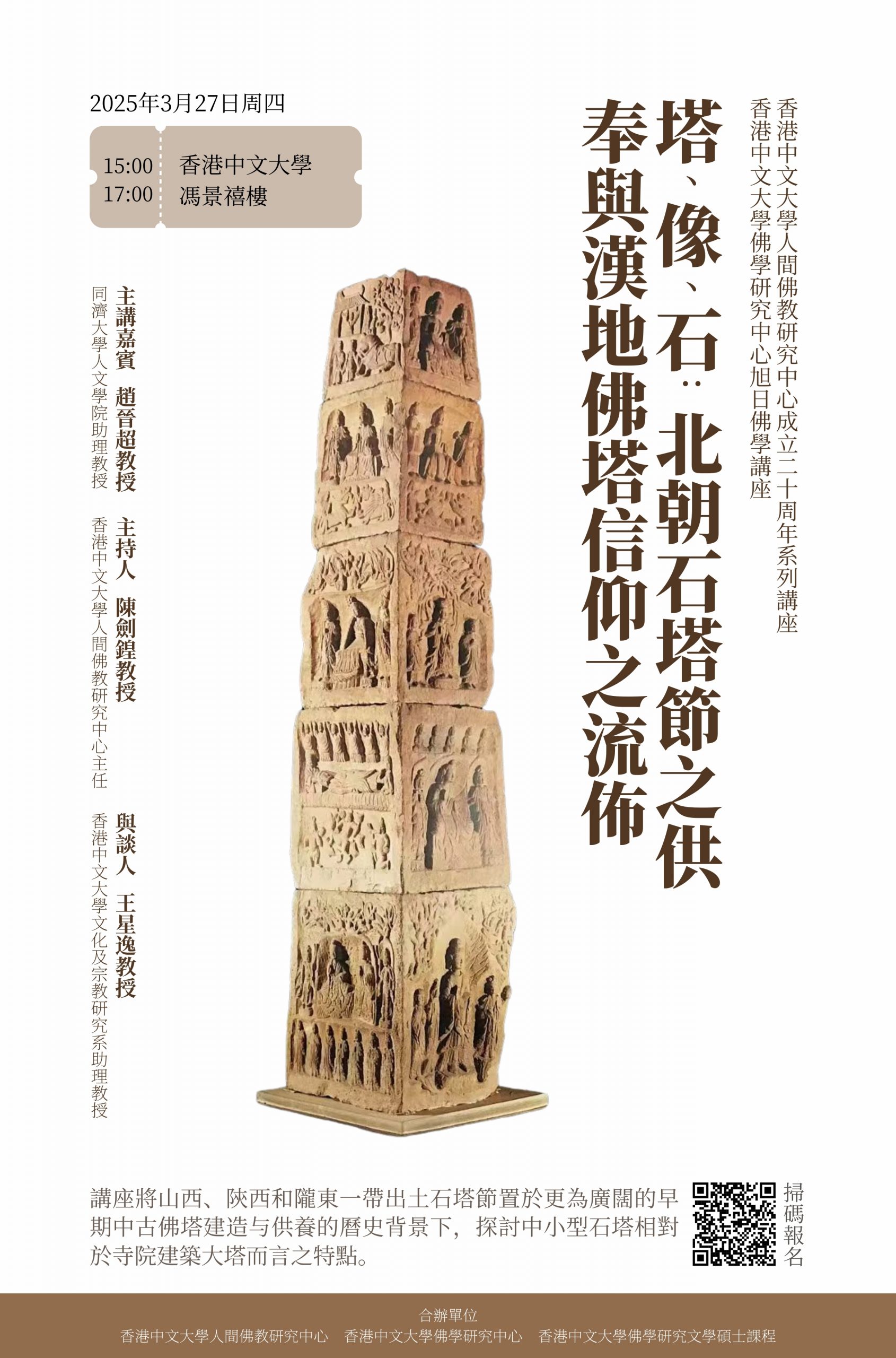
講題:
塔、像、石:北朝石塔節之供奉與漢地佛塔信仰之流佈
講者:
趙晉超教授 (同濟大學人文學院助理教授)
日期:
2025年3月27日 (星期四)
時間:
15:00 ~ 17:00
形式:
現場講座
地點:
香港中文大學馮景禧樓
語言:
普通話
報名:
講座簡介
上世紀中葉以降,山西到陝西、甘肅隴東一帶陸續出土一系列佛教石塔節。其中,山西沁縣南涅水村出土窖藏佛教石刻中的包括 400多塊方體造像石,隴東各地佛寺遺址散見造像石亦有近百塊。另有20世紀初時流失海外的多件石塔節。這些石塔節四面皆刻有佛教圖像,曾經逐級堆疊而起、立為佛塔。銘文顯示其製作時代集中在北魏至北齊時期。石塔節表面刻繪的豐富圖像信息与供奉銘文關涉石塔的製作、使用、供奉等信息,是我们分析佛塔信仰在北朝地方社會流佈情況的重要證據。然而現有研究多為具體圖像的個案研究,諸多問題尚未得到充分討論。
本次講座即將山西、陝西和隴東一帶出土石塔節置於更為廣闊的早期中古佛塔建造与供養的曆史背景下,探討中小型石塔相對於寺院建築大塔而言之特點。研究同時結合石塔与碑刻銘文,從北朝供養人角度分析「塔」、「像」、「石」之異同。此外,針對山西南涅水窖藏保存之完整性,網絡研究(network analysis)這一數字研究方法或可有效分析石塔節圖像的組合關係以及供養群體的組織關係。初步研究可視化展示了石塔圖像組合的多種方式和次序,为我们重建石塔節原本的堆疊關係以及北朝地方社邑供養人網絡情況提供了新的研究視角。
講者簡介
趙晉超教授,維吉尼亞大學藝術史博士,上海紐約大學與復旦大學亞洲研究聯合博士後,現任同濟大學人文學院藝術與文化產業系助理教授,上海市浦江人才,香港中文大學中國文化研究所和法國高等應用研究院訪問學人。主要研究方向為中古中國佛教藝術、早期印度佛教藝術、和20世紀印度華僑學校。已發表多篇中英文期刊論文、書籍章節與學術翻譯。
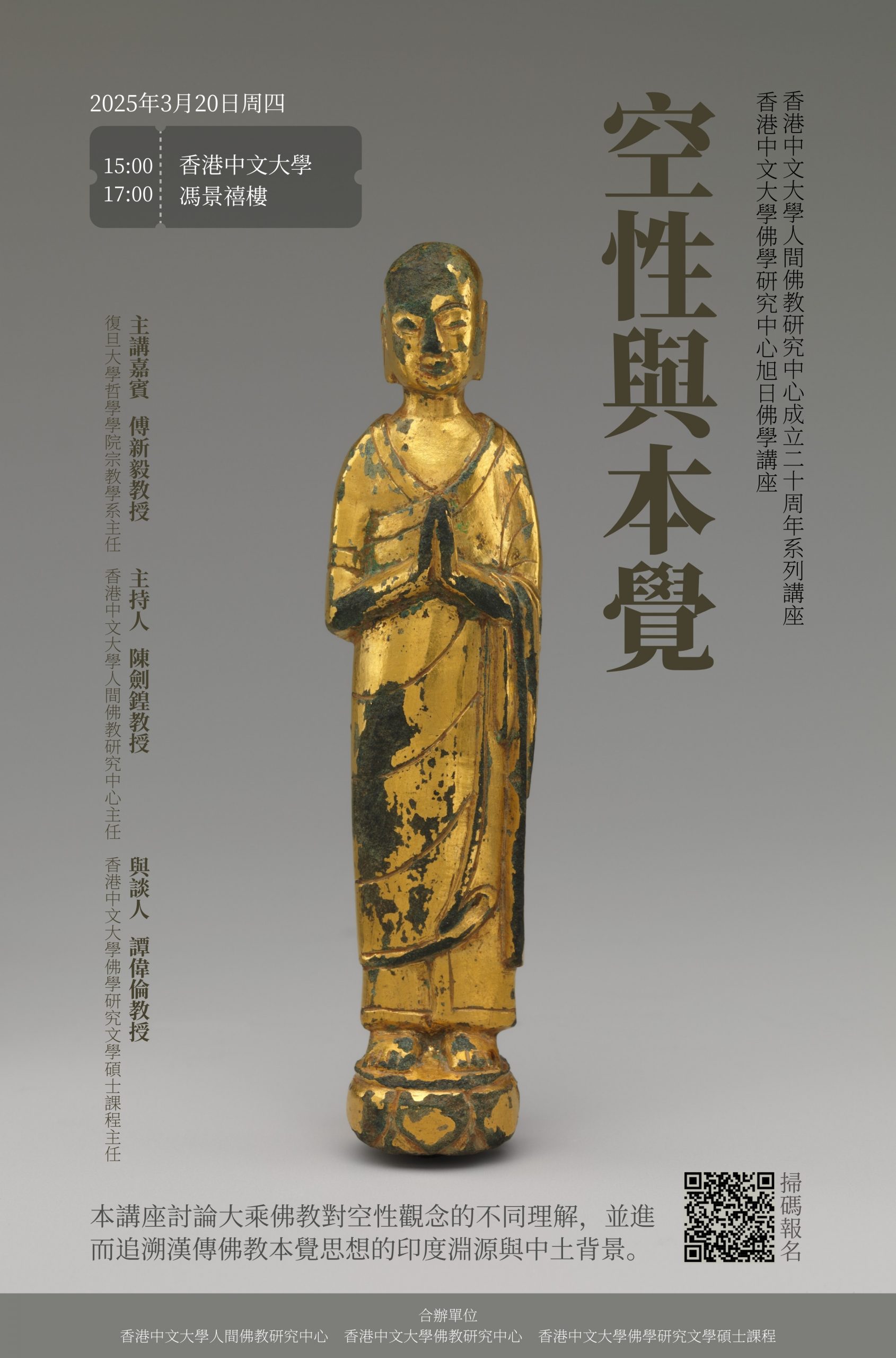
講題:
空性與本覺
講者:
傅新毅教授 (復旦大學哲學學院宗教學系主任)
日期:
2025年3月20日 (星期四)
時間:
15:00 ~ 17:00
形式:
現場講座
地點:
香港中文大學馮景禧樓
語言:
普通話
報名:
講座簡介
本講座討論大乘佛教對空性觀念的不同理解,並進而追溯漢傳佛教本覺思想的印度淵源與中土背景。
講者簡介
傅新毅教授,哲學博士。現任復旦大學哲學學院教授,博士生導師,宗教學系主任,宗教研究所所長。兼任《中華大藏經(漢文部分)·續編》編委會編委、副主編,《佛教文化研究》副主編,中國佛學院、閩南佛學院等博士、碩士研究生導師。主要研究領域為佛教哲學與佛教文獻,特別是唯識學、阿毗達磨、因明學等的研究。著作有《識體與識變——玄奘唯識學的基本問題》、《玄奘評傳》等。在海內外學術期刊發表學術論文40餘篇。
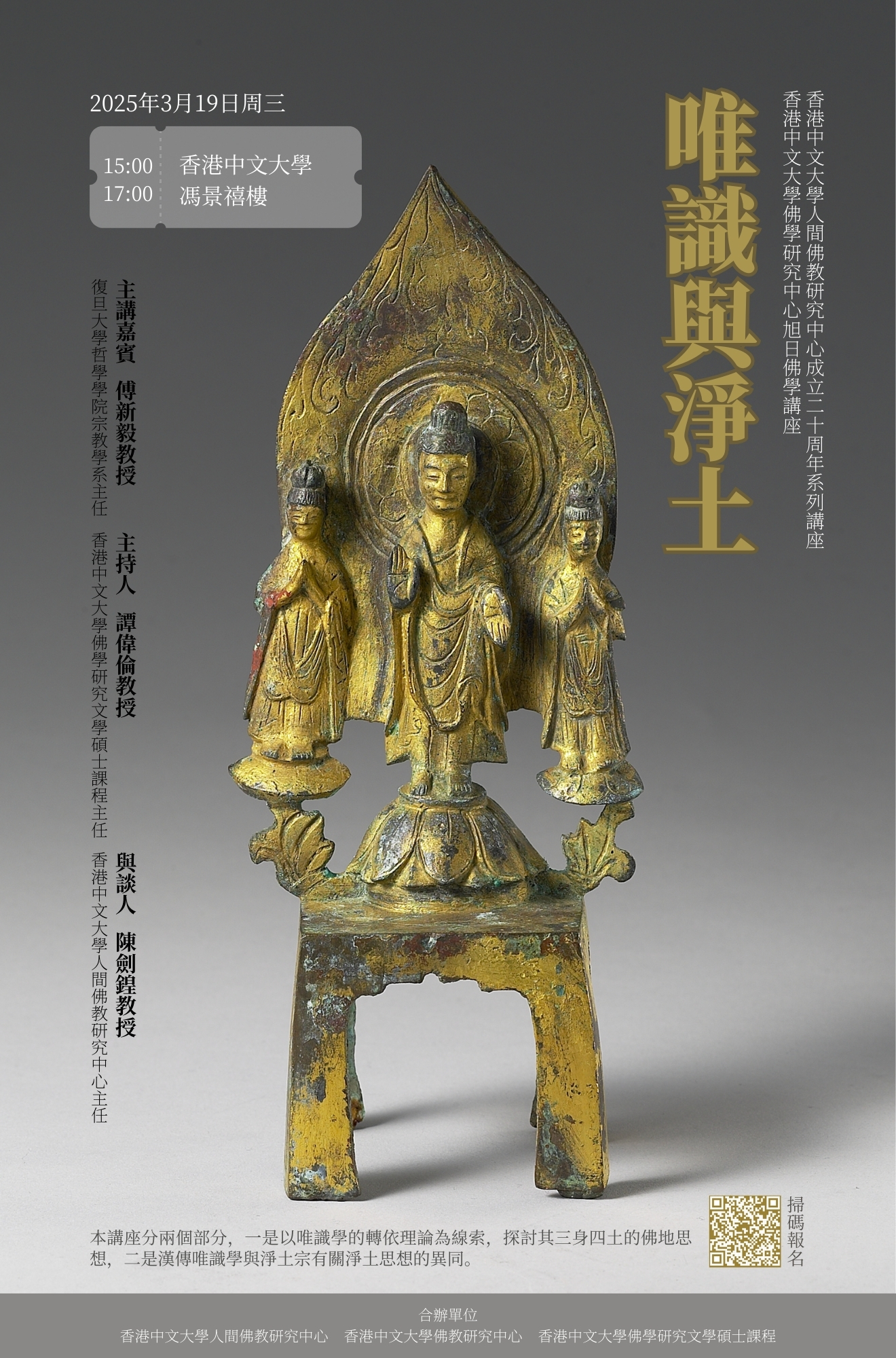
講題:
唯識與淨土
講者:
傅新毅教授 (復旦大學哲學學院宗教學系主任)
日期:
2025年3月19日 (星期三)
時間:
15:00 ~ 17:00
形式:
現場講座
地點:
香港中文大學馮景禧樓
語言:
普通話
報名:
講座簡介
本講座分兩個部分,一是以唯識學的轉依理論為線索,探討其三身四土的佛地思想,二是漢傳唯識學與淨土宗有關淨土思想的異同。
講者簡介
傅新毅教授,哲學博士。現任復旦大學哲學學院教授,博士生導師,宗教學系主任,宗教研究所所長。兼任《中華大藏經(漢文部分)·續編》編委會編委、副主編,《佛教文化研究》副主編,中國佛學院、閩南佛學院等博士、碩士研究生導師。主要研究領域為佛教哲學與佛教文獻,特別是唯識學、阿毗達磨、因明學等的研究。著作有《識體與識變——玄奘唯識學的基本問題》、《玄奘評傳》等。在海內外學術期刊發表學術論文40餘篇。
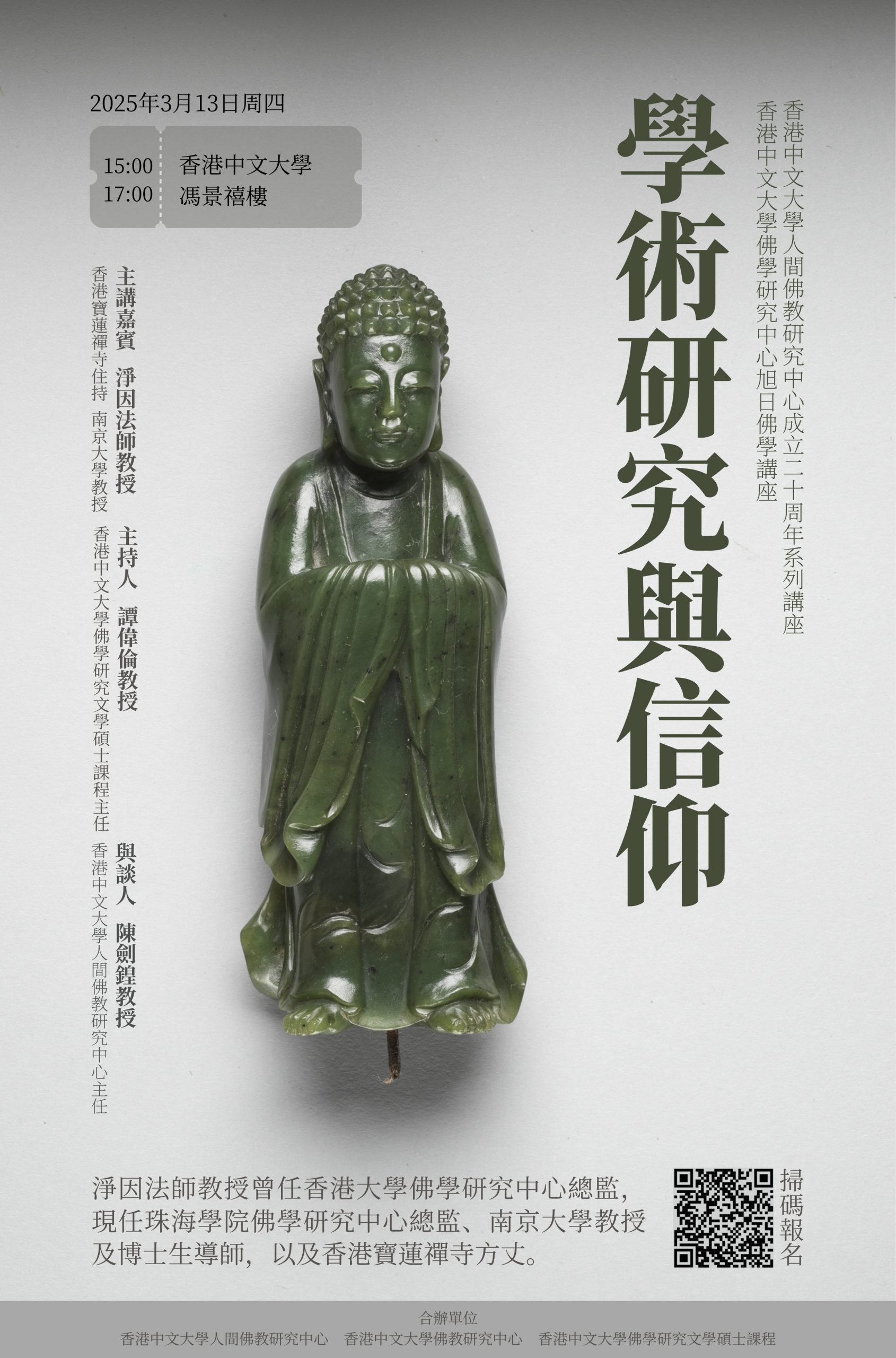
講題:
學術研究與信仰
講者:
淨因法師教授 (香港寶蓮禪寺住持、南京大學教授)
日期:
2025年3月13日 (星期四)
時間:
15:00 ~ 17:00
形式:
現場講座
地點:
香港中文大學馮景禧樓
語言:
普通話
報名:
講座簡介
在理性至上的學術領域中,信仰常被視為非科學的「他者」,兩者是否必然對立?本講座將深入探討學術研究與信仰體系之間的複雜互動,從科學哲學到宗教研究的多重視角,剖析理性思辨與靈性追尋的交織。淨因法師將分享寶貴的研究經驗,討論信仰如何影響學術思維,及其相互作用。法師還將深入分析不同文化背景下的信仰體系,並探討它們對研究方法和結果的潛在影響。
講者簡介
淨因法師,現任香港寶蓮禪寺方丈,南京大學教授及博士生導師,珠海學院佛學研究中心總監,香港大學客座教授,香港能仁專上學院校董、香港學術及職業資歷評審局學科專家,曾擔任香港大學佛學研究中心總監。
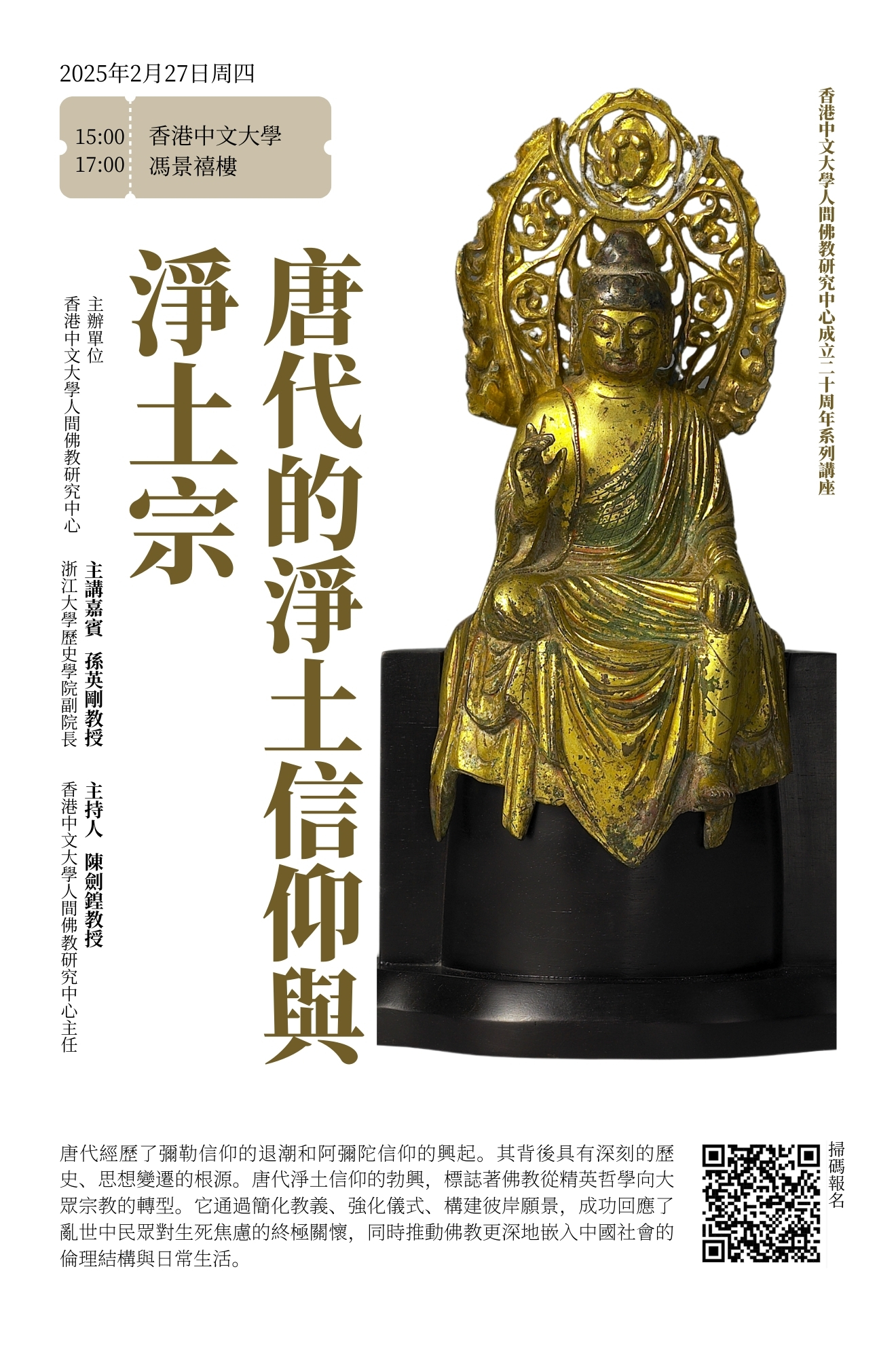
講題:
唐代的淨土信仰與淨土宗
講者:
孫英剛教授 (浙江大學歷史學院教授、常務副院長)
日期:
2025年2月27日 (星期四)
時間:
15:00 ~ 17:00
形式:
現場講座
地點:
香港中文大學馮景禧樓
語言:
普通話
報名:
講座簡介
唐代經歷了彌勒信仰的退潮和阿彌陀信仰的興起。其背後具有深刻的歷史、思想變遷的根源。唐代淨土信仰的勃興,標誌著佛教從精英哲學向大眾宗教的轉型。它通過簡化教義、強化儀式、構建彼岸願景,成功回應了亂世中民眾對生死焦慮的終極關懷,同時推動佛教更深地嵌入中國社會的倫理結構與日常生活。其遺產不僅體現於宗教實踐,更深刻影響了中國人的死亡觀念、藝術審美乃至社會組織形式,是中國佛教發展史上的重要層面。
講者簡介
孫英剛,普林斯頓大學博士,浙江大學歷史學院教授、常務副院長。教育部青年長江學者、國家社科基金重大專案首席專家,兼任中國魏晉南北朝史學會副會長。主要從事佛教史、中古史、絲綢之路的研究。出版《神文時代》《犍陀羅文明史》《隋唐五代史》等多部著作,在《歷史研究》《中國史研究》《世界宗教研究》等學術刊物發表學術論文100餘篇。多次受邀在歐美、日本、臺灣等地科研機構訪學和執教。
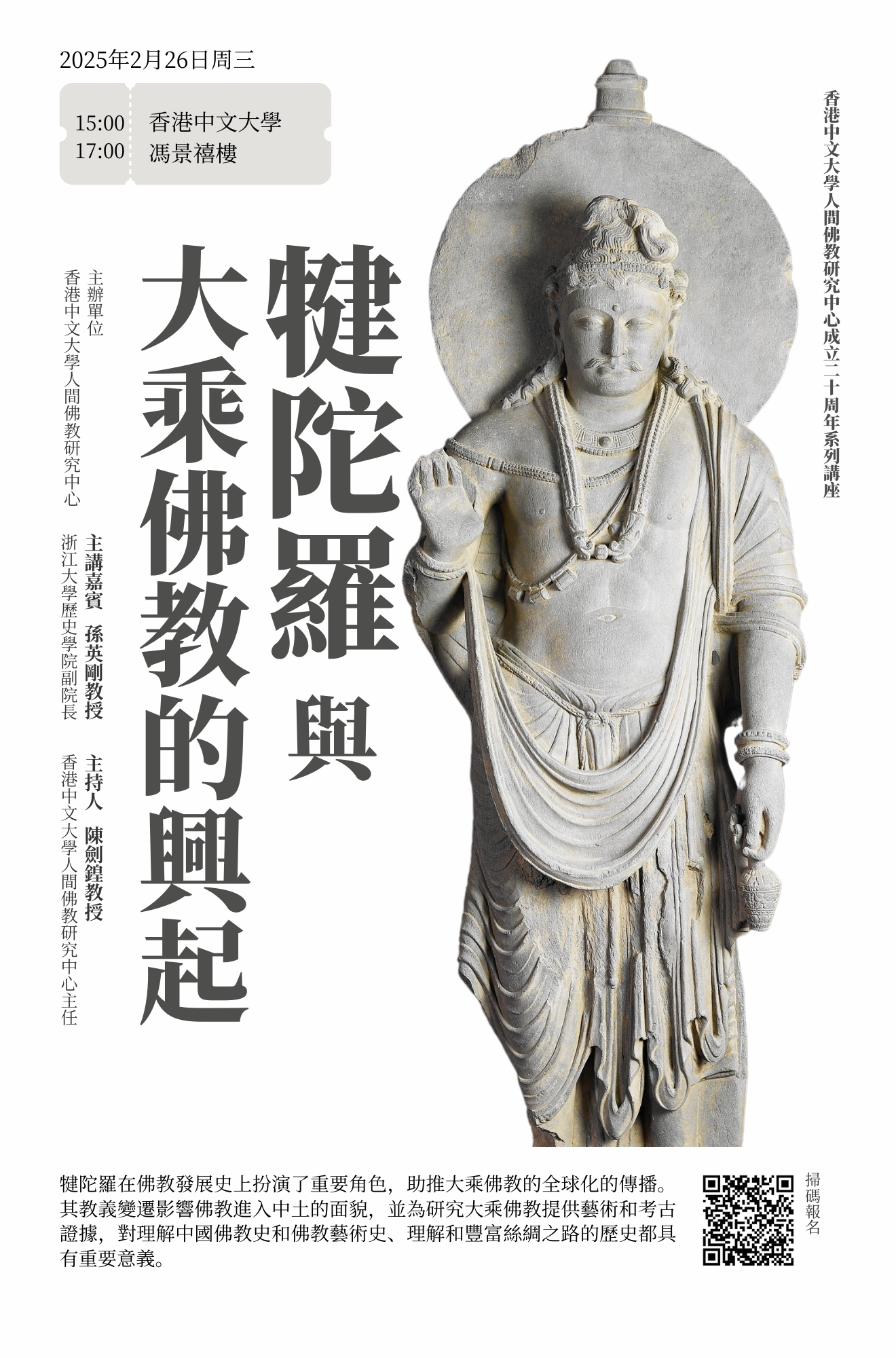
講題:
犍陀羅與大乘佛教的興起
講者:
孫英剛教授 (浙江大學歷史學院教授、常務副院長)
日期:
2025年2月26日 (星期三)
時間:
15:00 ~ 17:00
形式:
現場講座
地點:
香港中文大學馮景禧樓
語言:
普通話
報名:
講座簡介
犍陀羅在佛教發展史上扮演了重要角色。西元前後開始的大乘佛教在亞洲的傳播,可以說是一次“全球化”運動。在這裡,佛教經歷了教義和思想的變遷,包括菩薩信仰的繁榮、淨土信仰的興起、佈施精神的提倡等等。這些變化進而影響了佛教進入中土之後的面貌。很多中國佛教的思想元素和藝術符號,都可以在犍陀羅找到源頭。犍陀羅佛教的研究,為研究大乘佛教的興起,提供了藝術史和考古學的證據,可以從圖像上佐證文獻記載,進而豐富佛教發展的歷史圖景,對理解中國佛教史和佛教藝術史、理解和豐富絲綢之路的歷史都具有重要意義。
講者簡介
孫英剛,普林斯頓大學博士,浙江大學歷史學院教授、常務副院長。教育部青年長江學者、國家社科基金重大專案首席專家,兼任中國魏晉南北朝史學會副會長。主要從事佛教史、中古史、絲綢之路的研究。出版《神文時代》《犍陀羅文明史》《隋唐五代史》等多部著作,在《歷史研究》《中國史研究》《世界宗教研究》等學術刊物發表學術論文100餘篇。多次受邀在歐美、日本、臺灣等地科研機構訪學和執教。

